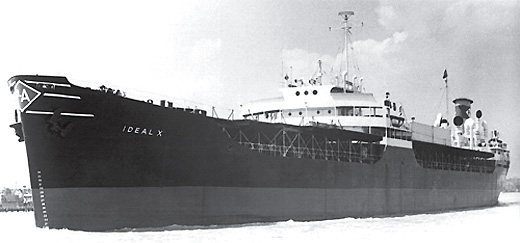| Container Revolution
The revolution began quietly. On April 26, 1956, at a backwater terminal at Port Newark, N.J., a company owned by former trucker Malcom McLean loaded 58 specially strengthened truck trailers on the spar deck of the tanker Ideal X for a coastwise voyage to Houston. Transportation would never be the same.
| Many were slow to adapt to McLean's introduction of containerized shipping |
The Journal of Commerce reported extensively on McLean’s plans, first announced in 1954 and refined over the next two years. But on the day after the initial sailing of the Ideal X, the newspaper carried only a three-paragraph report on the event. McLean’s innovation made little splash in an industry still focused on international services dominated by trans-Atlantic routes. New York was still the center of the maritime world, the port’s Hudson River piers still hummed with activity and McLean’s small domestic service was seen as peripheral.
 |
| Pan-Atlantic Steamship Co.'s Ideal X introduced containerized shipping in 1956. |
Many others were slow to recognize the impact that containerized shipping would have. A few days after the Ideal X first sailed with containers, New York port officials announced plans for a new pier at the foot of Houston Street in Manhattan to handle breakbulk cargo and passengers. Executives of traditional ship lines said intermodalism would never have more than limited application. They cited regulatory hurdles and operational difficulties: Who would want to ship whisky in containers? some carriers asked.
A few carriers immediately realized that their world had changed as dramatically as it did a century earlier in the switch from sail to steam. Other domestic carriers made plans to follow McLean into containerization. In the international trades, the transformation took longer. Grace Line built container ships for the U.S.-Venezuela trade, only to have its first ship stuck in port for 11 months when Venezuelan dockworkers refused to handle containers. The first container ships didn't cross the Atlantic until 1966.
 |
| Malcom McLean in 1999 |
Containerization drastically reduced longshore employment, made old ports obsolete and opened vast new possibilities for shippers. Cargo locked in steel boxes was less vulnerable to damage and theft. As costs fell and intermodal systems developed, shippers were able to expand their markets and product sourcing. Containerized shipping provided the means for transporting the surge in exports from Asian nations. The JoC provided blow-by-blow accounts of those developments.
Some of the biggest battles in the container revolution were waged in Washington. Intermodal shipping got a huge boost in the early 1970s when carriers won permission to quote combined rail-ocean rates. Later, non-vessel- operating common carriers won a long court battle with a Supreme Court decision against contracts that attempted to require that union labor be used for stuffing and stripping containers at off-pier locations.
For carriers, containerization made a capital-intensive business even more capital-intensive. It hastened a shakeout of liner operators, many of which were unable to understand their costs or properly price their services. Storied names such as United States Lines, American Export Lines, States Line and Pacific Far East Line faded into history. The consolidation has continued, with acquisitions such as A.P. Moller's purchase in 1999 of the international services of Sea-Land, the company McLean founded.
In recent years, as technological innovations have become less dramatic, the JoC's coverage of containerization has focused on development of logistics strategies made possible by intermodal shipping. Companies have benefited from reduced inventories and just-in-time supply chains, but the benefits haven't been problem-free. The rise of global supply chains continue to produce new challenges for importers and esxporters. |


